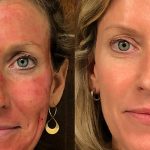Skin is the largest organ of the human body and is a major indicator of overall health. We want skin that is vibrant, supple and attractive. Yet, for many of us, the goal of glowing, healthy skin is elusive. Issues related to sensitive skin can be both frustrating and embarrassing.
There are many common conditions for irritating, sensitive skin. Understanding the causes and preventions of skin irritations allows you to achieve healthy skin. It’s time to equip yourself with knowledge about caring for sensitive skin.
The skin’s miraculous abilities to take in moisture and release toxins also leave it vulnerable to environmental stressors, infections and allergens. Take note of some of the most common causes of sensitive skin reactions:
Eczema
Eczema is an allergic skin condition that has a genetic component. This condition tends to run in families that deal with asthma and allergic reactions. This condition causes itchy, dry skin over the face and body.
The most common form, Atopic dermatitis, usually occurs in children. In this form, a red rash develops on the face, hands, feet, knees and scalp.
Treatments for eczema include washing with tepid water and the application of creams that relieve itching and inflammation. Medications are now available to prevent or lessen the severity of flare-ups.
Contact dermatitis
Contact dermatitis is a specific form of eczema that can be caused by jewelry, latex gloves, cleansers and plants such as sumac and poison oak and ivy. Redness, itching, rashes and blisters may occur at the site of contact.
Avoid contact with known allergens whenever possible. When contact is unavoidable, topical steroids and antihistamines can often alleviate symptoms.
If the cause of contact dermatitis is unknown, your doctor may do a patch test. During testing, common allergic substances are applied to the skin for a specified period. The skin is then checked for a reaction. Through the process of elimination, the source of the irritation may be determined.
Rosacea
Rosacea is a common skin disease that causes chronic swelling and redness located primarily in the face but also in the upper body. This condition has been connected to immune deficiencies as well as allergic reactions. The redness often resembles a sunburn. Small bumps, pimples and visible blood vessels may accompany the reddish tone.
Rosacea causes the face to be extremely sensitive to the touch. Contact with irritating fabrics, soaps, cosmetics or other substances may cause immediate stinging and burning sensations.
There are some prescription medications and creams that can reduce the problems associated with rosacea. These approaches have been found to reduce redness and constrict the flow of affected blood vessels.
Harsh ingredients in skincare products
For those with sensitive skin, some skincare products may do more damage than good. Some harsh ingredients to avoid in selecting skincare products include:
- Mineral oil: this substance, found in many cleansers and makeup removers, can cause breakouts. Mineral oils may be labeled as paraffin, petroleum and white oils. All of these ingredients are derived from mineral oil.
- Deodorant soaps: deodorant and other harsh body soaps strip skin of essential nutrients and extract moisturizing lipids from the surface. These soaps are intended to quickly remove unpleasant odors without consideration of long-term effects on the body, especially the face.
- Cleansers containing alcohol: alcohol is used as an antiseptic. However, alcohol is irritating and drying to the skin. Water-based cleansers and toners are much better for the skin than any product containing alcohol.
- Scented skincare products: products with heavy fragrances cause breakouts and irritations. Avoid ingredients such as lanolin, wool wax, formaldehyde, and other added ingredients to seal in or enhance fragrances.
Sun damage
Long-term exposure to ultraviolet radiation wreaks havoc on the skin. This exposure causes sagging skin, brown spots, wrinkling and a breakdown of collagen. Most seriously, it can also cause certain types of skin cancers. Sunburns can do short-term damage to the outer layers of the skin and long-term damage to its overall elasticity and ability to heal itself.
It is important to note that all skin types are at risk of sun damage. Therefore, everyone should be using adequate sunscreen and protection during any exposure to the sun. Avoid exposure during times when sunlight is most intense and seek shade when possible.
What can I do about sensitive skin?
Skin must be nourished and protected to thrive and not be derailed by occasional breakouts or mild allergic reactions.
Follow these simple guidelines provided below for valuing and protecting sensitive skin:
- Use gentle, fragrance-free laundry detergent and soaps.
- When shaving, always use a shaving gel or cream.
- Replace perfumes with appealing essential oils.
- Take short five to ten-minute showers with warm water.
- Pat yourself dry with a towel immediately after a shower or bath.
Your skin tells your story, including your family history, time outdoors and numerous adventures and events. Invest in your skin by avoiding irritants and caring for it with nourishing products so that it will continue to protect you and reveal your journey for years to come. For more information about sensitive skin and how to care for it, contact us today.






